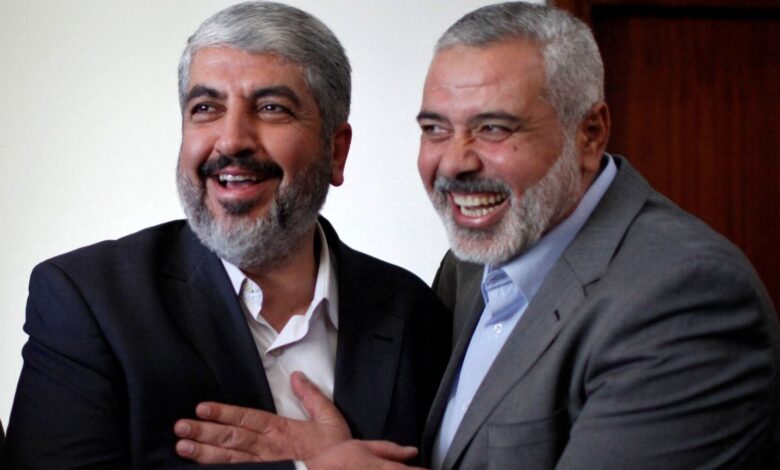How Benjamin Netanyahu boosted rise of Khaled Meshaal, likely new chief of Hamas

The assassination of Hamas chief Ismail Haniyeh in Iran removes one of Hamas’ key political figures, but it will not affect the leadership of the group’s military wing in Gaza.
Khaled Meshaal, a former leader of Hamas who survived an Israeli assassination attempt in 1997, is a prominent candidate likely to replace Haniyeh. Meshaal currently resides in Qatar and remains a powerful figure within the organization.
Hamas, a Gaza-based group, is considered a terrorist organization by Israel and the West. For Palestinian supporters, Khaled Meshaal and the Hamas leadership are champions of liberation from Israeli occupation, continuing their struggle for Palestinian rights in the face of failed international diplomacy.
Who is Khaled Meshaal?
Khaled Meshaal, 68, became Hamas’ political leader in exile in the year preceding Israel’s assassination attempt on him. This role allowed him to represent the Palestinian Islamist group at international meetings without being restricted by Israeli travel limitations that affected other Hamas officials.
Reuters, citing Hamas sources, reported that Khaled Meshaal is expected to be named the new leader of the group, succeeding Ismail Haniyeh, who was assassinated in Iran early Wednesday. Both Tehran and Hamas have vowed retaliation against Israel.
Senior Hamas official Khalil al-Hayya, based in Qatar and known for his role in indirect Gaza truce negotiations with Israel, is also considered a potential leader, favoured by Iran and its regional allies.
Khaled Meshaal’s relationship with Iran has been tense due to his previous support for the Sunni-led uprising against Syrian President Bashar al-Assad in 2011.
Since its founding in 1987 during the first Palestinian uprising, Israel has targeted numerous Hamas leaders and operatives. Meshaal, a prominent figure in Hamas since the late 1990s, has largely operated from exile, avoiding direct attacks on him while others in Gaza were targeted. After the assassination of Sheikh Ahmed Yassin in March 2004 and his successor Abdel-Aziz Al-Rantissi a month later, Meshaal took on the overall leadership of Hamas, Reuters reported.
Like other Hamas leaders, Meshaal has faced the challenge of deciding whether to pursue a more pragmatic approach towards Israel for the sake of Palestinian statehood—contrary to Hamas’ 1988 charter, which calls for Israel’s destruction—or to continue the armed struggle.
How does Meshaal see Israel?
Khaled Meshaal has rejected the notion of a permanent peace agreement with Israel but has suggested that Hamas might accept a Palestinian state in the West Bank, Gaza Strip, and East Jerusalem as a temporary measure in exchange for a long-term ceasefire.
The October 7, 2023, attack by Hamas militants from Gaza, which resulted in 1,200 deaths and over 250 kidnappings, underscored the group’s priorities. In response, Israel launched airstrikes and an invasion of Gaza, which have killed over 39,000 Palestinians and devastated much of the densely populated area.
Meshaal urged Arab and Muslim nations to join the fight against Israel and asserted that Palestinians alone should determine Gaza’s leadership after the current conflict ends. This stance challenges both Israeli and U.S. efforts to exclude Hamas from post-war governance.
Meshaal’s early life
Khaled Meshaal spent much of his life outside the Palestinian territories. Born in Silwad near Ramallah, he moved with his family to Kuwait, a stronghold of pro-Palestinian sentiment, when he was a child.
At 15, Meshaal joined the Muslim Brotherhood, which was crucial in founding Hamas during the late 1980s. Before becoming a prominent Hamas leader, he worked as a schoolteacher and later focused on international lobbying for the group. While Israel imprisoned many Hamas leaders, Meshaal was responsible for fundraising in Jordan when he narrowly escaped assassination, Reuters reported.
Role of Netanyahu in Meshaal’s career
Benjamin Netanyahu unintentionally strengthened Khaled Meshaal’s reputation as a militant when he ordered Mossad agents to assassinate him in 1997. This action was in retaliation for a Hamas bombing in Jerusalem that killed 16 people.
Netanyahu, then in his first term as Prime Minister, had to provide the antidote, turning Meshaal into a symbol of Palestinian resistance. Following the incident, Jordan closed Hamas’ office in Amman and expelled Meshaal, who later moved to Syria in 2001.
The operation, ordered by Israeli Prime Minister Benjamin Netanyahu, failed and led to a major diplomatic crisis.
Jordan’s then-King Hussein threatened to execute the assassins and cancel Jordan’s peace treaty with Israel unless the antidote was provided. Israel complied and also agreed to release Hamas leader Sheikh Ahmed Yassin, although he was later assassinated in Gaza in 2004.
Meshaal’s career
Khaled Meshaal led Hamas from exile in Damascus from 2004 until early 2012, when he left due to President Bashar al-Assad’s crackdown on Sunnis during the uprising. He now splits his time between Doha and Cairo.
During his time abroad, Hamas consolidated its control over Gaza, overtaking the Western-backed Palestinian Authority (PA) in a brief 2007 civil conflict. Meshaal’s efforts to reconcile with PA President Mahmoud Abbas led to tensions with Gaza-based Hamas leaders.
In 2017, amid these internal conflicts, Meshaal stepped down as Hamas’ leader and was succeeded by his Gaza deputy, Ismail Haniyeh. In 2021, Meshaal was elected to head Hamas’ office in the Palestinian diaspora.
(With inputs from agencies)
Catch all the Budget News , Business News , Breaking News Events and Latest News Updates on Live Mint. Download The Mint News App to get Daily Market Updates.
MoreLess



